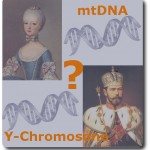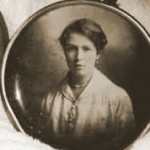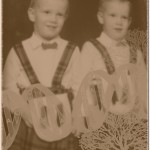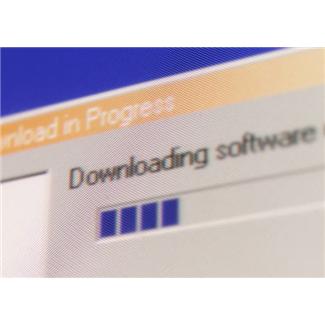Genealogy Technology
Immigrant Women: Our Courageous Ancestors
October 14, 2012 by ramona
Filed under Articles, Genealogy Technology, Latest News
 The book Immigrant Women, By Maxine Seller gives insight into the first impressions, hard lessons, joys and sorrows experienced by women who immigrated during the 19th and 20th centuries. In a collection of memoirs, oral histories, diaries and stories, the book records the specific struggles of women striving to build a new life in a new land.
The book Immigrant Women, By Maxine Seller gives insight into the first impressions, hard lessons, joys and sorrows experienced by women who immigrated during the 19th and 20th centuries. In a collection of memoirs, oral histories, diaries and stories, the book records the specific struggles of women striving to build a new life in a new land.
Most of the time we can only imagine what challenges our immigrant grandmothers faced and what they thought of their new home. Genealogy can only tell us so much: it is a treasure to read it in their words.
Excerpts
In her own words Marie Prisland, an immigrant from Slovinia, describes her arrival at Ellis Island in 1906. Her entry includes an eye opening description of what it was like the first time she became aware of cultural differences.
“An English speaking immigrant asked the near-by guard where we could get a drink of water. The guard withdrew and returned shortly with a pail of water, which he set before the group of women. Some men stepped forward quickly to have a drink, but the guard pushed them back saying: “Ladies First!” When the women learned what the guard had said, they were dumbfounded, for in Slovinia as in all Europe, women always were second to men.”
Leaving behind friends and family could lead to a lonely existence for many women as can be seen in this Norwegian immigrant women’s song.
Farewell, my old spinning wheel. How I shall miss you;
The thought of leaving you breaks the heart in my breast.
No more in the evening will we sit by the fireside, old friend of mine
and gossip together.
Ah, all that I see has its roots in my heart. And now they are torn out
Do you wonder it bleeds?
Immigrant Women, speaks in the voices of our grandmothers, engaging us in a narrative that opens a window into the past.
You can read Immigrant Women, free on Google books.
Genetic Genealogy, Historic Figures and Your DNA
October 5, 2012 by ramona
Filed under Articles, Genealogy Technology, Introduction to Genealogy, Latest News
 The world of genealogy is filled with family history stories connecting us to famous ancestors. After all, who wouldn’t want to include a celebrated historical figure in their family tree?
The world of genealogy is filled with family history stories connecting us to famous ancestors. After all, who wouldn’t want to include a celebrated historical figure in their family tree?
What if DNA testing could add fact to family fiction?
Recently I ran across a few websites that offered DNA testing for the purpose of matching clients DNA to that of famous historical figures. While I understand the allure of such testing, I have to admit that the skeptic in me was rather doubtful.
Among the historical figures listed were:
- King Tut
- Napolean Bonaparte
- Marie Antoinette
- Jesse James
- Genghis Khan
- Zar Nicholas Romanov
- Sven II Estridsen (Viking King of Denmark)
- Luke the Evangelist
- Petrarca (Italian Poet)
- Thomas Jefferson – Sally Hemmings
How it Works
In the case of some of the notables listed above, DNA samples have been gathered through various methods.
For instance, Marie Antoinette’s DNA was extracted from a lock of her hair and remains of one of her children. Jesse James DNA came from hair and bone fragments collected after an exhumation of his body. The DNA samples used for comparing DNA profiles with Napolean Bonaparte and Thomas Jefferson came from known descendants of these legendary figures.
So, how can they tell if you are a descendant of Genghis Khan, or ancient Irish and Scottish kings? The process of determining this comes from testing (on a very broad scale) to determine matches – or at the least – strong associations among DNA signatures and surnames. For example in the case of ancient Irish king, Nial of the Nine Hostages, geneticists studied 17 STR markers on the Y-chromosomes of a broad selection of Irish men. What they found was a connection between the DNA signature and several surnames.
Using DNA to establish your relationship to a famous historical figure works best in a controlled setting such as a one-name study. A good example of this is a study that already has a sample of DNA belonging to someone with a solid paper trail…AKA…a known descendant.
While these sites claim that they can match clients with historical figures, in most cases, they can only determine the likelihood of a relationship or tell if you share a common ancestor. The truth is that while genetic genealogy is a great tool…you will also need to do things the old-fashioned way and establish a paper trail.
Do Genealogy Specific Search Engines Simplify Your Family Tree Research?
September 11, 2012 by ramona
Filed under Articles, Genealogy Technology, Introduction to Genealogy, Latest News
Have you ever wished for a genealogy exclusive search engine that could:
Organize and simplify your family tree research?
Cut out all of the garbage returns and zero in on your specific search criteria?
Do it FAST and FREE
A search engine like this is on the top of my family history wish list and while it seems that every other genealogy search engine I come across is making claims that their tools use the ultimate in “Intelligent Search” or “Smart Technology”: I have yet to find one that fulfills all promises made.
In reality, what I have found is that most sites that make these claims simply redirect you to the major known genealogy sites or query boards.
While Mocavo comes close and Google does an excellent job with the right search terms the best strategy is simply gather up your family tree templates and go straight to a reputable record source such as Family Search, Ancestry.com or the archive/repository for the area you are searching.
In fact, if your search is geography specific it may be more worth your time and money to join the family history society that covers your specific location.
Finding the all the time you want to spend researching your family tree can be hard enough without wasting it on useless searches that yield few results.
Free Online Genealogy Books
September 7, 2012 by ramona
Filed under Articles, Genealogy Technology, Introduction to Genealogy, Latest News
 Something that always gets me excited about genealogy is finding great free resources online, especially ones that are:
Something that always gets me excited about genealogy is finding great free resources online, especially ones that are:
1. Unique
2. Packed with family history information
3. Available on other sites for a fee
Recently I discovered one on Google Books that I thought might be just as exciting for others researching their family tree whether they are experienced genealogists or genealogy beginners.
A Genealogical and Heraldic History of the Commoners of Great Britain and Ireland
A Genealogical and Heraldic History of the Commoners of Great Britain and Ireland, written by John Burke is a four-volume book published in the mid 1800s that contains information on almost 400 families in the first volume alone. What makes the book unique is that it contains information on people who were either landowners or held rank…but were not among the titled gentry.
Family History Information
Within the biographies contained between the covers, you will find names, vital events, occupations and geographic information on these families as well as specifics on individual members.
To give you an at-a-glance idea of what you may find let us look at the Beckford family of Fonthill.
The entry begins by identifying one William Beckford esq. of Fonthill Abbey in the county of Wilts. Who married the daughter of the fourth Earl of Aboyne . In a short introduction to his biography we learn that the William was a member of parliament and inherited his estates from his father.
Below the biography is the Lineage section which starts off with the origin of the family and continues on with short history including the military history of several family members.
Far from a dry pedigree, this family record includes such tit-bits as: Mr. Beckford is descended (Paternally or maternally) from all the Barons of the Magna Carta and had among his ancestors another William who was twice Lord Mayor of London.
At the end of the book family tree fanatics will find an appendix that lists:
- Banneretts and Knights made after the battles of Stoke and Blackheath by King Henry VII
- Officers commanding the queens forces anno 1569
- Knights of the Royal Oak
Want More Great Family Tree Resources?
Some other great free genealogy books that can be found on Google Books include:
- The knightage of Great Britain and Ireland
- The Court Journal: Court Circular & Fashionable Gazette: Volume 7
- Burke’s Peerage, Baronetage & Knightage: Clan Chiefs, Scottish Feudal Barons, Volume 1
- A Genealogical and Heraldic History of the Colonial Gentry
- Complete peerage of England, Scotland, Ireland, Great Britain
- Burke’s Royal Families of the World: Africa & the Middle East
Deep Ancestry and a Rediscovered Scottish Tribe
May 1, 2012 by ramona
Filed under Articles, Genealogy Technology, Introduction to Genealogy, Latest News
 Have you heard the term “Deep Ancestry” a process that uses both mtDNA and Y-DNA to find the most ancient roots on your family tree?
Have you heard the term “Deep Ancestry” a process that uses both mtDNA and Y-DNA to find the most ancient roots on your family tree?
This week Scotland’s DNA Project has come forward with some groundbreaking results using this process. Population Geneticist Dr. Jim Wilson of Edinburgh University along with journalist Alistair Moffat reported that the project has found one of Scotland’s long lost tribes.
The tribe called the Maeatae lived about 208 AD in the area around Stirling. History documents them in the works of the Roman writer Dio Cassius who recorded them as a hostile tribe living close to the Antonine Wall and in Adomnán’s Life of Columba (Saint Adomnán of Iona (627/8 – 704)). All references to the tribe disappeared after the 8th century…until now.
Moffat best known for his book The Scots: A Genetic Journey states “When the great Roman emperor Septimius Severus invaded Scotland with the largest army ever seen north of the Tweed, 40,000 legionaries and auxiliaries and a supporting fleet, he fought the Maeatae. They were mentioned by Roman historians as a fierce people and much later, noted by Adomnan, the biographer of St Columba. And then they disappeared from history,” Moffat goes on to say, “Now they are found. DNA has uncovered a high concentration of a distinctive marker clustered around Stirling and the foothills of the Ochils – the homeland of the fierce Maeatae. These are stories only DNA can tell.”
Other results from this study include:
- Nearly 100 distinctive Y-DNA groups have been found thus far
- One percent of Scottish men are descended from Tuareg and Berber Tribesmen of the Sahara
- The basic lineages of Scotland and England are similar
- Actor Tom Conti is a descendant of Napoleon Bonaparte
Test participants paid around 170 pound to have their DNA tested. From these, lineages were discovered for one Viking, one Arab, a Hebridean and three Saxons.
The future of the project promises even more excitement as Dr. Wilson reveals that they will be looking even closer at Neanderthal DNA in Scotland.
Google Books and Your Family Tree
February 6, 2012 by ramona
Filed under Articles, Genealogy Technology, Introduction to Genealogy, Latest News, Lesson 8 Articles
 Google Books can be an amazing resource for beginning genealogists. Whether you are looking for information specific to your family tree, something related to a current research interest like military records or general information on genealogy; Google Books is a good place to start.
Google Books can be an amazing resource for beginning genealogists. Whether you are looking for information specific to your family tree, something related to a current research interest like military records or general information on genealogy; Google Books is a good place to start.
To Find Google Books:
- Go to Google.com and hit the little arrow at the top of the toolbar next to “more”
- In the drop down menu click on “Books”
You should now be on the Google Books, search page.
Search Google Books for Genealogy Treasures
It is easy to find books with Google Books; all you do is enter a keyword into the search box. For example:
When I enter “Military Records”, I get about 1,860,000 results, including:
· Military records: Confederate soldiers, 1861-1865
· U.S. military records: a guide to federal and state sources
· Army Records: A Guide for Family Historians
A general search under “Genealogy” brings about 6,750,000 results, including:
· Genealogy Online For Dummies
· The Online Genealogy Handbook
· Genealogy: a practical research guide
Of course, you can alter your search terms to be location specific or even surname specific.
Using Google Books to find a specific ancestor can really pay off as well. Using my ancestor “Marin Boucher”, I find the following:
The Boucher heritage
books.google.caLaurent Boucher – 1999 – 298 pages – Snippet view
This map also shows that Marin Boucher and two of his sons, Francois and Jean- Galleran, had settled near the present village of Chateau-Richer about seven miles from Quebec City: It is worthwhile noting that many of the colonists whose …
“200” family trees: from France to Canada to U.S.A.
books.google.ca – Snippet view
The above Jean Galeran Boucher was the son of Marin and Perinne Mallet who were married around 1628 at St-Langis-les-Mortagne,France. Marin Boucher’s parents were unknown but he came from Mortagne.He was the brother of Jeanne who was …
If you want to see information about a book listed just click on the title of the book. By doing this, you may also find (if the author has given permission) “snippets”. Snippets are areas of the book specifically related to you search terms. Snippets will tell you how many pages in the book match your search terms.
When you find a book you are interested in you can select the “Buy this Book” option or “Find this book in a library” and be directed to a library where you may borrow it. Sometimes, if you are lucky the book you find may be out of copyright and available free online.
Another search option you can try with Google Books is “Full View Books”. Select this option when you only want to search for books you can fully view online.
Genealogy Beginner encourages you to try using Google Books for your family tree research. If you find any amazing books, please share your discoveries with other genealogy beginners on the Discovery Panel forum.
Image Credit: someofthisandthat via Photobucket
Using Google Scholar for Genealogy
January 23, 2012 by ramona
Filed under Articles, Genealogy Technology, General Tips, Introduction to Genealogy, Latest News
 Among the many tools available to genealogy researchers, one that beginning genealogists may not be as familiar with is Google Scholar. Although this wonderful tool is not likely to lead you to any major records databases, it can however direct you towards relevant-to-you information sources for your family tree research.
Among the many tools available to genealogy researchers, one that beginning genealogists may not be as familiar with is Google Scholar. Although this wonderful tool is not likely to lead you to any major records databases, it can however direct you towards relevant-to-you information sources for your family tree research.
Using Google Scholar will also save you a good deal of time. Time you may otherwise spend sifting through millions of hits from common search engine queries.
Google Scholar for Genealogy
Google scholar is a tool that will let you conduct a broad search of scholarly materials possibly containing information on your ancestors.
Google Scholar provides a scholarly listing of:
To give you a better idea of what you may actually find by using Google Scholar as a search source lets first look at one of my ancestors, Marin Boucher. Then try it again with your own research interests.
I know that Marin Boucher was an early settler in New France (what is now modern day Quebec Canada). I can find a great deal of record sources for him through online databases. However, using Google Scholar may lead me to look for additional information I may not otherwise find or even consider.
To find Google Scholar:
You should now be on the Google Scholar, search page.
To get best results with Google Scholar it is best to conduct a narrow search by typing “Marin Boucher” into the search bar including the quotation marks. You will get a good list of hits; however, most of them will be in French.
If you do not speak or read French, You can opt for “Search for English results only” at the top left corner of the page or use the Google Translate tool to read any information you find.
Looking down the list of hits, you will notice that some of them are underlined. The underlined returns will take you to an information source. If you are lucky, the source will be a free online book. Some of the returns (not underlined) will be citations or additional sources such as related articles, PDF documents or directories.
For Marin Boucher we find all of these information types. Because they are all in French, I have used Google Translate before listing a few of them here.
Book:
[BOOK] A Canadian parish in the seventeenth century
[HTML] from google.ca
HR Casgrain – 1880 – books.google.com
… who was buried in the church. Her neighbor, Jean Galleran Boucher, was a family
native of Mortagne. His father. Marin Boucher is one of the oldest settlers
of New France. In the year 1625, it is found …
Cited by 8 – Related articles – Find in AMICUS
PDF Document:
Citation:
[QUOTE] Marin Boucher in Canada: direct descent
Genealogical Society Lanaudière … – 1997 – Genealogical Society …
Find in AMICUS
Related Article:
Related Article and PDF Document:
[QUOTE] Marin Boucher in Canada: direct descent
Genealogical Society Lanaudière … – 1997 – Genealogical Society …
Find in [PDF] “The French-speaking Quebec from 1608 to 1960”
[PDF] from banq.qc.ca
H Charbonneau – The population of Quebec from yesterday to tomorrow, …, 1991 – bibnum2.banq.qc.ca… Jean Guyon (Dion) and Mathurin Robin, Zacharie Cloutier and Sainte Dupont, Jacques Archambault and Françoise Tourault, Marin Boucher, Noel Lee, Abraham Martin, Pierre Miville, that some of the founders of the most cele-bers, the strain that we …Related articles – View as HTML – All 2 versions
From this short list, you can see that I have found several sources of information on my ancestor including:
- A book that is available free on Google Books
- A citation that will lead me to additional information
- A related article available in PDF
There were far more returns than those listed here and although I would likely have come up with these leads with a common Google search it would have taken me far longer to sift through the Google hits to find the most relevant.
Genealogy Beginner encourages you to try using Google Scholar for your family tree research. Additionally, we would love to hear your Google Scholar success stories; share with us and other beginning genealogists on the Discovery Panel forum.
Free Genealogy Software: Making Your Choice
December 10, 2011 by ramona
Filed under Articles, Genealogy Technology, Getting Started, Introduction to Genealogy, Latest News, Lesson 8 Articles
 Choosing a genealogy software program really boils down to choosing the right program for you. To know this you will have to try out a few for yourself. Adding up to three generations during your test trials is a minimum time investment that will:
Choosing a genealogy software program really boils down to choosing the right program for you. To know this you will have to try out a few for yourself. Adding up to three generations during your test trials is a minimum time investment that will:
- Reveal the program that is the best match for you
- Give you a good idea of what your chart and reports will look like
Using this approach helped me narrow it down to the following three excellent choices in free genealogy software.
Genealogy Research Software (Gramps 3.3)
Overall Gramps is a great program that has pretty much every feature chart and report option you could dream of. If you have great computer skills you are going to love it, if not this may not be a good program for you. Gramps also has a few extra features that are quite nice, like the Gramplets feature that helps you monitor your progress and analyze data.
For a more in depth review of Gramps3.3 including a link where you can download the software for free, join us on the Genealogy in General forums now.
RootsMagic 5
The free version of RootsMagic genealogy software is slick, good looking and starts off with an option to import data right at the opening screen. RootsMagic is also loaded with an impressive list of features and extras. The only drawback to this superb free version of the program is that it will not attach documents or allow you to publish your research. However that should not be a great deterrent as those features and many more are available on the full paid version should you choose RootsMagic as your long term genealogy software?
For a more in depth review of RootsMagic including the download links join us on the Genealogy in General forums now.
My Heritage Family Tree Builder
My Heritage open source family tree software has an incredible, easy to navigate layout in a gorgeous design. With fantastic easy access drop down menus and a convenient back button it makes entering data fast and efficient. The downside of this amazing free program is that there is a data entry limit of 250 individuals. I don’t really consider that a serious deal breaker for the beginning genealogist, as you can choose from a three tier upgrade adding as needed; or export to GedCom if you want to change programs.
For a more in depth review with download links of My Heritage join us on the Genealogy in General forums now.
Don’t be afraid to download a few programs and give them a try. I can assure you that removing the unwanted programs is as simple as the initial down loads. Please remember; before you start downloading to scan for viruses.
Don’t forget to join us on the forums for a breakdown of the key features in each of these exceptional free version genealogy software programs.
image credit: office.microsoft.com
Free Genealogy Software – 3 Things to Know
December 3, 2011 by ramona
Filed under Articles, Genealogy Technology, Getting Started, Introduction to Genealogy, Latest News, Lesson 8 Articles
 Eventually most genealogy beginners are going to start thinking about a genealogy software program to record their research. There certainly are a lot of wonderful jam packed programs on the market to choose from. However, during the early stages of an ancestor hunt there is really no need to spend a lot of money (before you even have a good idea of what you want) on a Family Tree software program full of bells and whistles.
Eventually most genealogy beginners are going to start thinking about a genealogy software program to record their research. There certainly are a lot of wonderful jam packed programs on the market to choose from. However, during the early stages of an ancestor hunt there is really no need to spend a lot of money (before you even have a good idea of what you want) on a Family Tree software program full of bells and whistles.
All You Really Need
A simple nuts and bolts genealogy software program that allows you to carry forward with your research, while keeping your family tree organized, is all that is really needed. A practical solution to this is, open source or “free” family tree software, that you can download in 10 minutes or less.
Free Family Tree Software Essentials
1. A good open source program for a beginning genealogist is one that will:
• Easily record your data
• Compile your evidence
• Help you to analyze your findings
2. A better beginning program will be:
• Easy to navigate
• Catch errors
• Provide tutorials
• Offer tech support
3. The best program has all of the above and is:
• Upgradable – you will not have to re-enter your data
• GedCom compatible – you are free to choose whatever long term program you like.
Using open source genealogy software gets you started immediately. In addition, some of these free programs rival a lot of the paid programs available. I know this because I have spent the last few days testing out several of them and am in the process of testing several more.
At this point you may be saying “Gee thanks, but I still don’t know what one to choose”. Not to worry, over the next few days Genealogybeginner.com will have your choices narrowed down to a top three short list of open source programs; perfect for the beginning genealogists. Check back to see the final results.
On the Other Hand
You may have your heart set on purchasing your long term genealogy software program now. Or maybe you are thinking of purchasing one as a gift for someone special? Before you do, make certain you check out Genealogybeginner.com’s Lesson 8: A Look at Genealogy Software. A pivotal lesson that takes a long hard look at the enormous and baffling world of genealogy software, then demystifies it before your eyes.
image credit: treelady via photobucket
My heritage: The Family Friendly Search Engine
April 19, 2010 by Chris
Filed under Articles, Genealogy Technology, Getting Started, Introduction to Genealogy
 Guest Post by Nick Capallero
Guest Post by Nick Capallero
Anyone involved in genealogical research knows about the difficulty in tracking long lost family members, in obtaining and organizing official records and placing them in an easy-to-use family tree for all the family. Although nowadays one can get help online, a good and trustworthy genealogy research tool, specializing in finding ancestors and advancing our family research, is essential.
Continue reading “My heritage: The Family Friendly Search Engine” »
